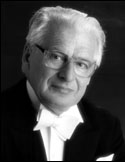Fall 2002 Honorary Doctorates
Franz-Paul Decker
 |
|
Montrealers who have had a longstanding ear in the musical community, or those in the avid audience of CBC radio, will be familiar with Franz-Paul Decker. Conductor and artistic director of the Montreal Symphony Orchestra for eight years starting in 1967, Decker is returning to Montreal to receive an honorary doctorate of music at the Fall 2002 Convocation on October 31.
Words alone won't express the conductor's recognition -- Decker will be waving a baton to conduct the McGill Symphony Orchestra in excerpts of Richard Strauss's Der Rosenkavalier at the ceremony. This won't be the first time he's stood in front of McGill students. In 1992 and again in 2000, Decker conducted the same orchestra to terrific local acclaim.
Decker was born in Cologne, Germany, in 1923. In the early '40s he studied at the Cologne Hochschule für Musik and took courses in conducting, composition and pedagogy at the University of Cologne.
When he was 22, he made his conducting debut with the Cologne opera. At age 26, he moved to Wiesbaden to direct both the Symphony and the Staatsoper. In 1962, Decker became artistic director of the Rotterdam Philharmonic Or-chestra, where he flourished. Thereafter he was invited to conduct a number of the finest orchestras in Europe.
After his turn in Montreal, where, under his direction, the MSO became renowned for precise and expressive performances, Decker directed the Calgary Philharmonic Orchestra, the Winnipeg Symphony Orchestra, and the Opéra de Québec, and was principal guest conductor of the National Arts Centre Orchestra from 1991 to 1999. His 30-plus year association with the New Zealand Symphony Orchestra led to his being named their Conductor Laureate.
The early '90s saw him embark on Mahler's complete symphony and song cycles in the Teatro Colón in Buenos Aires, and from 1995 to 1998 he conducted Wagner's Der Ring des Nibelungen in the same grand space.
Sally Wishart Armstrong, C.M.
 |
|
It seems an unlikely stretch: phys ed teacher becomes reporter. But Sally Wishart Armstrong has gone from a teaching diploma from Macdonald College and a McGill bachelor's degree in physical education in 1966 to being an award-winning writer who tackles the difficult stories. From the plight of child prostitutes in Toronto and Bangladesh, to stories of rape as a war tactic in Bosnia and Rwanda, Armstrong's writing is unflinching in subject. She will receive an honorary doctorate at the Fall 2002 Convocation on October 31.
Armstrong is now most lauded for her work on Afghanistan women under Taliban rule. Her latest book, Veiled Threat: The Hidden Power of the Women of Afghanistan, chronicles her research over the past five years. She profiles Dr. Sima Samar, now Afghan deputy prime minister, who during the Taliban regime set up illegal schools for girls and supplied medical services for women.
She started her journalism career when an acquaintance asked if she'd like to help out with a new magazine in the '70s, Canadian Living, by writing pieces on fitness. Shortly after, Armstrong was tackling challenging subjects -- her newspaper debut was a front-page article for The Globe and Mail about a Canadian team's successful expedition up Mount Everest.
In 1988, then associate editor of Canadian Living, Armstrong was lured to the magazine Homemaker's as editor. Convinced that "women wanted more meat on the bones of the news," Armstrong offered hard-hitting stories to her readership. She profiled women members of the Canadian Armed Forces during the Persian Gulf War preparing to go overseas; she spent 12- hour days at the Kingston Penitentiary for Women to describe life behind bars; and she started her stories on the women of Afghanistan.
Currently, she is editor-at-large for Chatelaine magazine, and a contributing editor of Maclean's. Last November she was appointed by UNICEF as Special Representative to Afghanistan, which meant checking the situation for women and children in the country while war was being waged against Osama bin Laden and the Taliban.
Armstrong has won the Amnesty International Media Award, the YWCA Women of Distinction Award in Communi-cations, and in 1988, she was named a Member of the Order of Canada.
For information on Sally Armstrong's public lecture at McGill, October 30, see on campus.

